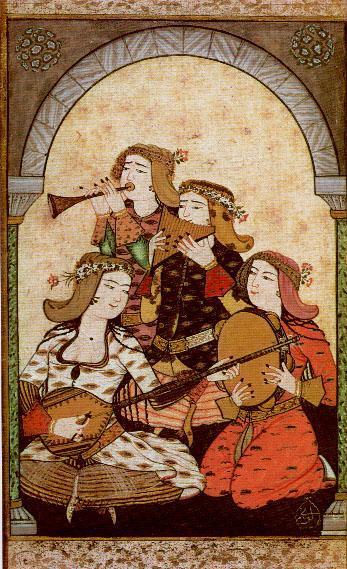|
Gökhan Birben
Gökhan Birben is a Turkish singer and artist of Hamsheni descent. Birben attended school in Rize until graduating from high school. After graduating at the age of 17, he ended up in Istanbul where he attended the Istanbul University State Conservatory The Istanbul University State Conservatory (Turkish language, Turkish: ''İstanbul Üniversitesi Devlet Konservatuarı'') is a Public university, public Music school, conservatory affiliated with Istanbul University, specializing in music, theatre, .... Upon joining the Kadıköy Moda Musical Association, he began training in Turkish classical music, but Birben is yet to adapt this style of music. He became interested in football and played for two years as a member of the Fenerbahçe youth team. He has also worked as a radio reporter. Birben released his first album in 2003, ''Hey Gidi Karadeniz.'' The language of the songs are Homshetsi and Laz. Albums Hey Gidi Karadeniz (26 March 2003) # Hey Gidi Karadeniz # Oy Oy Gü ... [...More Info...] [...Related Items...] OR: [Wikipedia] [Google] [Baidu] |
Rize
Rize (; ; ; ka, რიზე}; ) is a coastal city in the eastern part of the Black Sea Region of Turkey. It is the seat of Rize Province and Rize District.İl Belediyesi Turkey Civil Administration Departments Inventory. Retrieved 30 January 2023. Its population is 119,828 (2021). Rize is a typical Turkish provincial capital with little in the way of nightlife or entertainment. Since the border with Georgia was opened in the early 1990s, the Black Sea coast road has been widened and the town is much wealthier than it used to be. Current Turkish President 's family has its roots in Rize and the |
Tulum (bagpipe)
The ''tulum'' () is a musical instrument, a form of bagpipe from the Black Sea region of Turkey. It is droneless with two parallel chanters, and is usually played by the Laz people, Laz, Black sea Turks, Hemshin peoples and by Pontic Greeks, particularly Chaldians. It is a prominent instrument in the music of Pazar, Rize, Pazar, Hemşin, Çamlıhemşin, Ardeşen, Fındıklı, Rize, Fındıklı, Arhavi, Hopa, some other districts of Artvin and in the villages of the Tatos range (the watershed between the provinces of Rize Province, Rize and Trabzon Province, Trabzon) of İspir. It is the characteristic instrument of the transhumant population of the northeastern provinces of Anatolia and, like the Kemençe of the Black Sea, kemençe in its area, the ''tulum'' imposes its style on all the dance and entertainment music of those for whom it is "our music". Terminology Some of the names of bagpipes from the Near East include: *Guda (Laz language, Laz) *Gudastviri, Gudastvri, გ� ... [...More Info...] [...Related Items...] OR: [Wikipedia] [Google] [Baidu] |
Folk Music
Folk music is a music genre that includes #Traditional folk music, traditional folk music and the Contemporary folk music, contemporary genre that evolved from the former during the 20th-century folk revival. Some types of folk music may be called world music. Traditional folk music has been defined in several ways: as music transmitted orally, music with unknown composers, music that is played on traditional instruments, music about cultural or national identity, music that changes between generations (folk process), music associated with a people's folklore, or music performed by Convention (norm), custom over a long period of time. It has been contrasted with popular music, commercial and art music, classical styles. The term originated in the 19th century, but folk music extends beyond that. Starting in the mid-20th century, a new form of popular folk music evolved from traditional folk music. This process and period is called the (second) folk revival and reached a zenith ... [...More Info...] [...Related Items...] OR: [Wikipedia] [Google] [Baidu] |
Turkish People
Turks (), or Turkish people, are the largest Turkic peoples, Turkic ethnic group, comprising the majority of the population of Turkey and Northern Cyprus. They generally speak the various Turkish dialects. In addition, centuries-old Turkish communities in the former Ottoman Empire, ethnic Turkish communities still exist across other former territories of the Ottoman Empire. Article 66 of the Constitution of Turkey defines a ''Turk'' as anyone who is a citizen of the Turkish state. While the legal use of the term ''Turkish'' as it pertains to a citizen of Turkey is different from the term's ethnic definition, the majority of the Turkish population (an estimated 70 to 75 percent) are of Turkish ethnicity. The vast majority of Turks are Sunni Islam, Sunni Muslims, with a notable minority practicing Alevism. The ethnic Turks can therefore be distinguished by a number of cultural and regional variants, but do not function as separate ethnic groups. In particular, the culture of the ... [...More Info...] [...Related Items...] OR: [Wikipedia] [Google] [Baidu] |
Hemshin People
The Hemshin people (, ; ), also known as Hemshinli or Hamshenis or Homshetsi, are a bilingual ethnographic group of Armenians who mostly practice Sunni Islam after their conversion from Christianity in the beginning of the 18th century and are affiliated with the Hemşin and Çamlıhemşin districts in the province of Rize, Turkey. They are Armenian in origin, and were originally Christians and members of the Armenian Apostolic Church, but evolved into a distinct community over the centuries and converted to Sunni Islam after the conquest of the region by the Ottomans during the second half of the 15th century. In Turkey, Hemshin people do not speak the Homshetsi dialect apart from the "Eastern Hamsheni" group living in provinces of Artvin and Sakarya and their mother tongue is now Turkish. For centuries, the ongoing migration from the geographically isolated highlands to lowlands made the Hemshin people settle in the areas near Trabzon, Artvin and in the Western ... [...More Info...] [...Related Items...] OR: [Wikipedia] [Google] [Baidu] |
Istanbul University State Conservatory
The Istanbul University State Conservatory (Turkish language, Turkish: ''İstanbul Üniversitesi Devlet Konservatuarı'') is a Public university, public Music school, conservatory affiliated with Istanbul University, specializing in music, theatre, and dance, located in Istanbul. It is recognized as the oldest conservatory and the oldest continuously operating music school in Turkey. The university provides music training from secondary school levels up to doctoral studies. Its main building, situated in Kadıköy, is a historical market hall, with the ground floor currently functioning as an active theatre venue. History The State Conservatory has its beginnings in its later sister institution, ''Darülbedayi'' (English language, English: House of Beauty). In 1914, Cemil Topuzlu embarked on an enterprise to establish the imperial school of drama and music, and French actor André Antoine was invited to Istanbul for this purpose. In its initial structure, ''Darülbedayi'' would teac ... [...More Info...] [...Related Items...] OR: [Wikipedia] [Google] [Baidu] |
Homshetsi Dialect
Homshetsi (; ) is an archaic Armenian dialect or a language spoken by the eastern and northern group of Hemshin peoples (''Hemşinli''), a people living in northeastern Turkey, Abkhazia, Russia, and Central Asia. It has some differences from Armenian spoken in Armenia. It was not a written language until 1995, when linguist Bert Vaux designed an orthographic system for it based on the Turkish alphabet; the Armenian alphabet was used by Christian immigrants from Hamshen (Northern Hamshenis)—who refer to the language as Homshetsma (Հոմշեցմա) in Russia and Abkhazia. Homshetsi is a spoken language amongst the Eastern Hemshinli, also known as the Hopa Hemshinli, who live in a small number of villages in Turkey's Artvin Province and Central Asia. The Western or Rize Hamsheni are a related, geographically separate group living in Rize Province, who spoke Homshetsi until sometime in the 19th century. They now speak only Turkish with many Homshetsi loanwords. A third group, th ... [...More Info...] [...Related Items...] OR: [Wikipedia] [Google] [Baidu] |
Laz Language
The Laz or Lazuri language () is a Kartvelian languages, Kartvelian language spoken by the Laz people on the southeastern shore of the Black Sea. In 2007, it was estimated that there were around 20,000 native speakers in Turkey, in a strip of land extending from Melyat to the Georgian border (officially called Lazistan until 1925), and around 1,000 native speakers around Adjara in Georgia (country), Georgia. There are also around 1,000 native speakers of Laz in Germany. Laz is not historically a written language or literary language. As of 1989, Benninghaus could write that the Laz themselves had no interest in writing in Laz. Classification Laz is one of the four Kartvelian languages also known as South Caucasian languages. Along with Mingrelian language, Mingrelian, it forms the Zan languages, Zan branch of this Kartvelian languages, Kartvelian language family. The two languages are very closely related, to the extent that some linguists refer to Mingrelian and Laz as dial ... [...More Info...] [...Related Items...] OR: [Wikipedia] [Google] [Baidu] |
Turkish People Of Hemshin Descent
Turkish may refer to: * Something related to Turkey ** Turkish language *** Turkish alphabet ** Turkish people, a Turkic ethnic group and nation *** Turkish citizen, a citizen of Turkey *** Turkish communities in the former Ottoman Empire * The word that Iranian Azerbaijanis use for the Azerbaijani language * Ottoman Empire (Ottoman Turkey), 1299–1922, previously sometimes known as the Turkish Empire ** Ottoman Turkish, the Turkish language used in the Ottoman Empire * Turkish Airlines, an airline * Turkish music (style), a musical style of European composers of the Classical music era * Turkish, a character in the 2000 film '' Snatch'' See also * * * Turk (other) * Turki (other) * Turkic (other) * Turkey (other) * Turkiye (other) * Turkish Bath (other) * Turkish population, the number of ethnic Turkish people in the world * Culture of Turkey * History of Turkey ** History of the Republic of Turkey * Turkic languages ... [...More Info...] [...Related Items...] OR: [Wikipedia] [Google] [Baidu] |
Turkish Musicians
The roots of traditional music in Turkey span across centuries to a time when the Seljuk Turks migrated to Anatolia and Persia in the 11th century and contains elements of both Turkic and pre-Turkic influences. Much of its modern popular music can trace its roots to the emergence in the early 1930s drive for Westernization. Âşık, atışma, singing culture, wedding dance continued way of having fun with family and friends as before. Due to industry music and music in daily life aren't same. Turkish people including new generations have nostalgia music culture., pp 396-410. With the assimilation of immigrants from various regions the diversity of musical genres and musical instrumentation also expanded. Turkey has also seen documented folk music and recorded popular music produced in the ethnic styles of Greek, Armenian, Albanian, Polish, Azeri and Jewish communities, among others. Many Turkish cities and towns have vibrant local music scenes which, in turn, support a num ... [...More Info...] [...Related Items...] OR: [Wikipedia] [Google] [Baidu] |
Living People
Purpose: Because living persons may suffer personal harm from inappropriate information, we should watch their articles carefully. By adding an article to this category, it marks them with a notice about sources whenever someone tries to edit them, to remind them of WP:BLP (biographies of living persons) policy that these articles must maintain a neutral point of view, maintain factual accuracy, and be properly sourced. Recent changes to these articles are listed on Special:RecentChangesLinked/Living people. Organization: This category should not be sub-categorized. Entries are generally sorted by family name In many societies, a surname, family name, or last name is the mostly hereditary portion of one's personal name that indicates one's family. It is typically combined with a given name to form the full name of a person, although several give .... Maintenance: Individuals of advanced age (over 90), for whom there has been no new documentation in the last ten ... [...More Info...] [...Related Items...] OR: [Wikipedia] [Google] [Baidu] |






